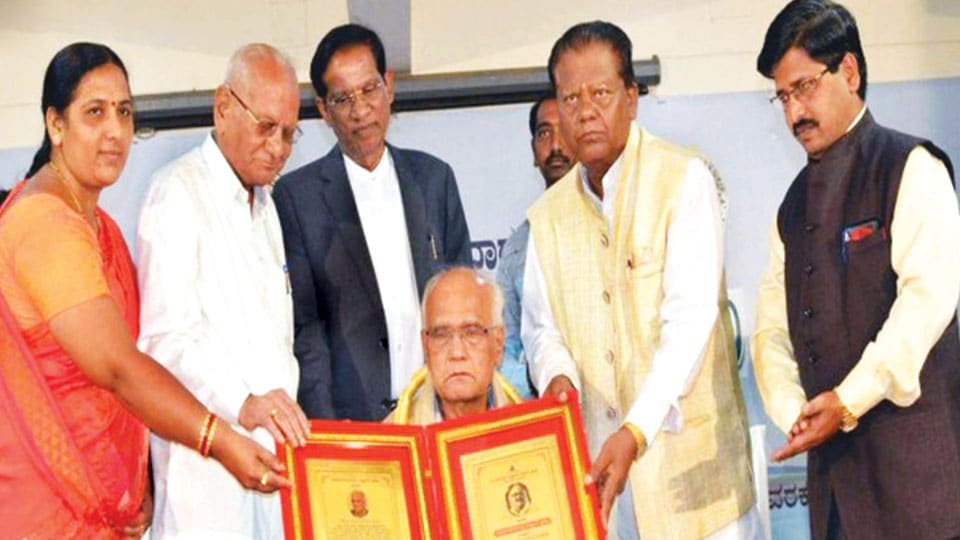Celebrated writer cites advanced age; says he is not getting any fresh ideas
Mysore/Mysuru: Noted litterateur and Saraswathi Samman Awardee Dr. S.L. Bhyrappa has hinted that his long innings as an active writer was nearing its end and he was not getting any fresh ideas to write and give shape in the form of a book.
Dr. Bhyrappa was speaking at an interaction programme after receiving Ambikatanayadatta National Award given by Da. Ra. Bendre National Memorial Trust, Dharwad, yesterday. The Ambikatanayadatta Award carries a citation, memento and a cash reward of Rs. 1 lakh.
The 85-year-old writer, who sometimes says that he is busy with “Sahitya Krishi” (literary creation) when people call him over phone to invite him to literary events, said that all signs indicate that the time had come for him to lay down his pen.
“I am not sure Kannada literary arena can expect any more books from me,” he said. Dr. Bhyrappa is a veritable colossus in the world of Indian literature and he has kept his pen firmly on the page for more than 50 years. He has authored more than 25 novels and all of them are bestsellers and has a huge fan base.
Farewell to writing
Dr. Bhyrappa said that after ‘Uttarakaanda’, he had not written anything. Age might be a factor in the lack of fresh ideas, he said. He said that his advanced age was one of the reasons for contemplating a farewell to writing. ‘Uttarakaanda’ (which is a re-telling of the Hindu epic Ramayana published in 2017) was Dr. Bhyrappa’s last novel.
Admitting that he had been seized by an impulse to drop his pen for good earlier as well, Dr. Bhyrappa added, “But I was often gripped by another idea, another theme and I would set to work on those. This has not come to pass this time around since I have no theme to work on. Considering my age, I do not think Kannada literature can expect another novel from me.”
Medium of instruction in schools
Sharing his thoughts on the rather contentious issue of introducing the mother-tongue as a medium of instruction in schools, the doyen of Kannada literature said, “I have discussed this subject with Prime Minister Modi and impressed on him the need for native language of the State serving as the medium of instruction till Class IV. I suggested that the Supreme Court’s order on this issue needs to be overturned by means of Legislation.”
Dr. Bhyrappa said that the PM had concurred with his views on the subject. “However, he expressed helplessness pointing to the habit of the Opposition parties to question each Bill tabled in the Parliament. He told me that his party colleagues also spoke after the manner of the Opposition parties,” Dr. Bhyrappa added.
Caste system in India
He took exception to Brahmins being targeted for creating the caste system in the country and said that caste system in India originated based on occupation and were not created by anyone. “In India, caste was tied to professional benefits. It was mutually beneficial for the daughter of a weaver to marry a man in the same profession. Today, you will find doctors choosing spouses in the medical profession,” Dr. Bhyrappa added.
Referring to writers taking a stand on social movements, he said it was not good for society. “If literature is produced favouring a movement, there are more chances that people will follow the book and media houses will give it wide publicity. If a writer takes a stand against the movement, everyone will pounce on him. A writer should keep abreast of the developments, but should not try to appease someone,” he said.
Writers and movements
During his illustrious career, Dr. Bhyrappa refused to identify himself with any particular literary movement, and during the interaction, he underscored the perils of writers’ association with a set of ideas. “Literary movements tie down writers to a particular ideology. A writer associated with such a movement will have to produce works that conform to its ideology,” he said.
Training guns at the cliquish power structures at play in the world of letters, Dr. Bhyrappa said, “One will find that works adhering to an ideology will be reviewed favourably by critics who are also acolytes of the same. Similarly, when a writer deviates from this ideology, he or she is reproached. I believe that a writer must steer clear of any such movement.”








Recent Comments